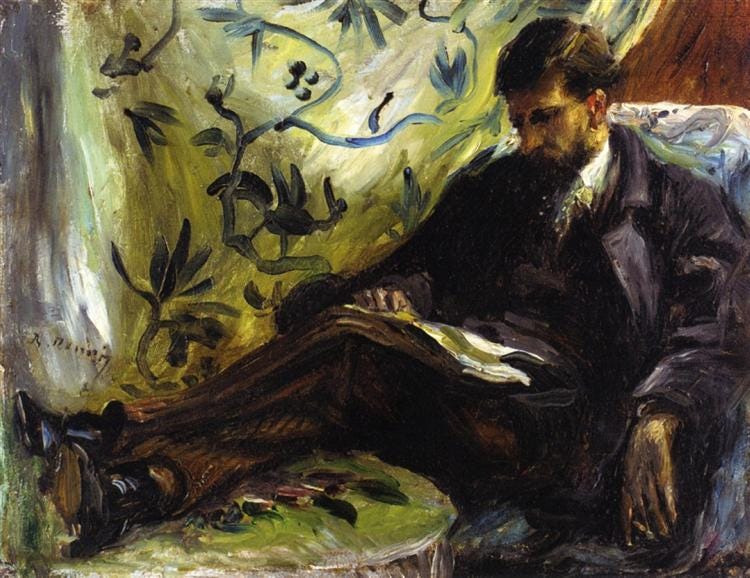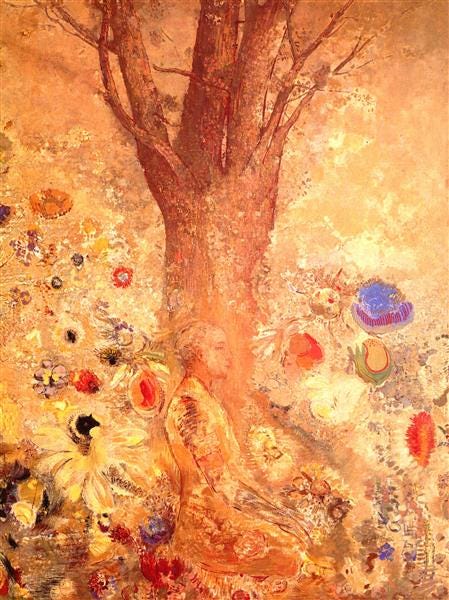Hello, my friends,
I had written this issue on Monday because I was supposed to be on a camping trip with my brother to Table Mountain (in California, not South Africa) when it was to drop on Friday morning. Alas, fate intervened and last weekend Ashley got sick, and then Michael got sick — I thought it passed me over like COVID had when everyone had it but no, on Tuesday evening my throat hurt and it was all out germ warfare on Wednesday. I’m feeling better now (Thursday evening), but am at home on the computer and not in a tent. Having finished my ecology course on Kinnu, I anticipated that some of what I learned would reveal itself in the ecosystem of the Angeles National Forest — I’d just downloaded the iNaturalist app, too, so my plan was to upload some neat plants, spiders or other bugaroos (like the Darkling Beetle I spotted on a hike recently!). Will reschedule the trip. Don’t tell the bears!

Regeneration of Values
I’ve been slowly making my way through On Leadership by John W. Gardner for the past while (books seem to take me a long while these days) and marking notable passages with little pink post-its. That I’m running low on post-its is indicative of the amount of wisdom contained therein. In his chapter on "Tasks of Leadership," Gardner included the "Regeneration of Values" which perhaps would be better stated as "renewal". This task is all too easy to forget in the hubbub of daily tasks, but a team and an organization stays strong because there is a shared vision, symbols, and history. Some team members will carry those forward, but it is leaders who must affirm the existence and importance of shared values. Gardner wrote:
One of the milder pleasures of maturity is bemoaning the decay of once strongly held values. Values always decay over time. Societies that keep their values alive do so not by escaping the processes of decay but by powerful processes of regeneration. There must be perpetual rebuilding. Each generation must rediscover the living elements in its own tradition and adapt them to present realities. To assist in that rediscovery is one of the tasks of leadership.
The leaders whom we admire the most help to revitalize our shared beliefs and values. They have always spent a portion of their time teaching the value framework. (13-14)
After reading that, does a leader past or present come to mind? What did they do to cultivate enduring values? What values do you uphold for your family, friends, colleagues, yourself?
The Desire
Around February of 2021, I quit imbibing caffeine of any kind. The reasons were not related to religious conviction or specifically to do with health. And while avoiding the caff has improved my sleep and added more stability to my mood, the main reason I quit was because I began to loathe the “Desire”. Smokers, drinkers, and coffee hounds become familiar with the urge, that anticipation of vaunted consequences; coffee is delicious, but feeling better about life for a few hours…Priceless. That dynamic made me uncomfortable.
I said it wasn’t religious conviction that put me off caffeine, but the fact is that it was my amateur interpretation of the nature of the Four Noble Truths of Buddhism that set me on the path. I’ve read a lot about Buddhism over the years and it’s non-metaphysical application to everyday life is infinitely sensible to me. It all starts with: 1) All is suffering, 2) There is a cause for suffering, 3) There can be an end to suffering, 4) By following the Noble Eightfold Path.
A cause of suffering (truth #2) is Taṇhā (craving), more specifically, Kāma-taṇhā (craving for things that tickle the senses, or provide sensual pleasure). There are ways to approach this idea from multiple angles because Buddhism is the religion of a million lists, but I reasoned, in essence, that the desire for the pleasant aftermath of drinking caffeine (coffee/soda/etc.) is a form of suffering that I could choose to avoid. So I did.*
Thank You, Papa
Earlier today, Michael found a little light-up bouncy ball that I had reluctantly picked up from the LA County Dept. of Beaches & Harbor booth at an outreach event a while ago in my mailbox. He asked if it was for him and I admitted that it was. He was so excited! “Thank you, papa!” he said and gave me a hug. An hour later, he came back and gave me another hug. “Why?” I asked. The ball.
Michael says “Thank you, papa!” (and “Thank you, mama”) a lot and I just love it. Partially it arouses my feelings because it shows that he’s a polite little boy, partially it’s because I appreciate his sincere gratitude, and partially because it’s just so adorable — the intonation, the words, the earnestness! Parenting has its rewards.
*- There are the devil’s advocates out there that surely read “The Desire” and thought, but you still drink alcohol, eat rich foods, and derive sensual pleasure from many things so your highfalutin rationale for quitting caffeine is pretty weak. No argument from me. We humans are pretty silly, on the whole.





